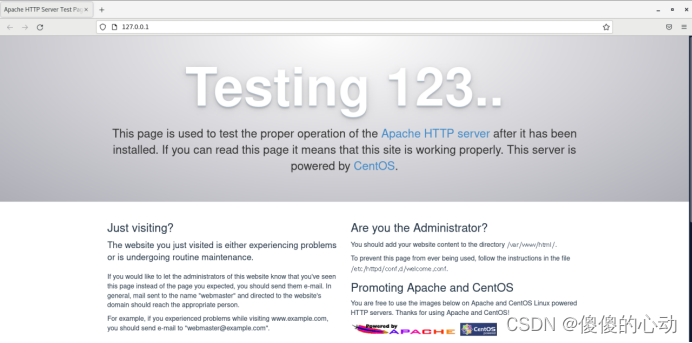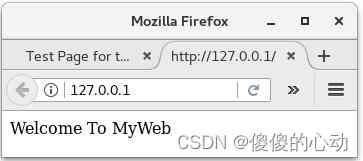安装、启动与停止Apache服务
安装Apache相关软件
[root@
centos7
~]#
rpm -q httpd
[root@centos7-1 ~]#
mkdir /opt/centos
//创建目录
/opt/centos
[root@centos7-1 ~]#
mount /dev/cdrom
/opt/centos
//
挂载光盘到
/opt/centos
下
mount: /dev/sr0 写保护,将以只读方式挂载
[root@centos7-1 ~]#
mv /etc/yum.repos.d/* /home
//移动文件到/home下
[root@centos7-1 ~]#
vim /etc/yum.repos.d/local.repo
//别忘了
制作用于安装的yum 源文件
[centos]
name=centos
baseurl=file:///opt/centos
gpgcheck=0
enabled=1
[root@
centos7
~]#
yum clean all
//安装前先清除缓存
[root@
centos7
~]#
yum install httpd -y
[root@
centos7
~]#
yum install firefox –y
//安装浏览器
[root@
centos7
~]#
rpm –qa|grep httpd
//检查安装组件是否成功
注意:一般情况下,firefox默认已经安装,需要根据情况而定。
启动Apache服务的命令如下
(
重新启动和停止的命令分别是restart和stop)
:
[root@
centos7
~]#
systemctl start httpd
让防火墙放行,并设置SELinux为允许
(1)使用防火墙命令,放行http服务。
[root@
centos7
~]#
firewall-cmd
–list-all
[root@
centos7
~]#
firewall-cmd
–permanent
–add-service=http
success
[root@
centos7
~]#
firewall-cmd
–reload
success
[root@
centos7
~]#
firewall-cmd
–list-all
public (active)
target: default
icmp-block-inversion: no
interfaces: ens33
sources:
services: ssh dhcpv6-client samba dns
http
……
(2)更改当前的SELinux值,后面可以跟Enforcing、Permissive或者1、0。
[root@
centos7
~]#
setenforce
0
[root@
centos7
~]#
getenforce
Permissive
注意:利用setenforce设置SELinux值,重启系统后失效,如果再次使用httpd,则仍需重新设置SELinux,否则客户端无法访问Web服务器。如果想长期有效,请修改/etc/sysconfig/selinux文件,按需要赋子SELINUX相应的值(EnforcinglPermissive,或者“0″|“1”)。这里多次提到防火墙和SELinux,请读者一定注意,许多问题可能是防火墙和SELinux引起的,且对于系统重启后失效的情况也要了如指掌。
测试httpd服务是否安装成功
[root@
centos7
~]#
systemctl start httpd
[root@
centos7
~]#
systemctl enable httpd
[root@
centos7
~]#
firefox
http://127.0.0.1

图1 Apache服务器运行正常
认识Apache服务器的配置文件
在Linux系统中配置服务,其实就是修改服务的配置文件,httpd服务程序的主要配置文件及存放位置如表1所示。
表1 Linux系统中的配置文件及存放位置
|
|
|
|
|
|
|
|
|
|
|
|
|
|
|
|
|
|
Apache服务器的主配置文件是httpd.conf,该文件通常存放在/etc/httpd/conf目录下。文件看起来很复杂,其实很多是注释内容。
httpd.conf文件不区分大小写,在该文件中以“#”开始的行为注释行。除了注释和空行外,服务器把其他的行认为是完整的或部分的指令。指令又分为类似于shell的命令和伪HTML标记。指令的语法为“配置参数名称 参数值”。伪HTML标记的语法格式如下:
<Directory />
Options FollowSymLinks
AllowOverride None
</Directory>
在httpd服务程序的主配置文件中,存在3种类型的信息:注释行信息、全局配置、区域配置。在httpd服务程序主配置文件中,最为常用的参数如表2所示。
表2 配置httpd 服务程序时最常用的参数以及用途描述
|
|
|
|
|
|
|
|
|
|
|
|
|
|
|
|
|
|
|
|
|
|
|
|
|
|
|
|
|
|
|
|
|
|
|
|
|
|
|
从表2中可知,DocumentRoot参数用于定义网站数据的保存路径,其参数的默认值是把网站数据存放到/var/www/html目录中;而当前网站普遍的首页面名称是index.html,因此可以向/var/www/html目录中写入一个文件,替换掉httpd服务程序的默认首页面,该操作会立即生效(在本机上测试)。
[root@
centos7
~]#
echo “Welcome To MyWeb” > /var/www/html/index.html
[root@
centos7
~]#
firefox http://127.0.0.1
程序的首页内容已经发生了变化,如图2所示。

图2 首页内容已发生改变